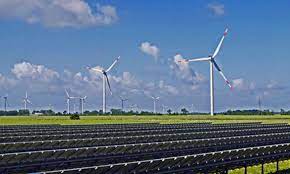Abu Dhabi September 17 2021: Abu Dhabi and long-time oil concession holder BP plan to develop billions of dollars in clean-energy projects in both the UAE and the UK, with three agreements announced Sept. 16 for investments in hydrogen, sustainable aviation and carbon capture, among other technologies.
The deals are the latest efforts by the hydrocarbon-rich emirate to scale up its fledgling alternative energy sector and diversify its economy by partnering with international oil companies, many of whom are under pressure from shareholders and regulators to green their portfolios.
A L S O || R E A D
Pakistan suffered economic loss of $150 billion due to conflict in Afghanistan
Under the agreements, BP, Abu Dhabi National Oil Co. and the emirate's clean energy development arm Masdar say they will aim to develop an initial 2 GW of low carbon hydrogen production capacity in the UK and the UAE and implement a "decarbonized air corridor" for flights between the two countries.
BP and Masdar would also "explore opportunities to provide sustainable energy and mobility solutions for cities in the UK, UAE and beyond," according to the announcement, while BP and ADNOC would seek to lower the carbon intensity of their existing oil and gas operations, including the development of CCUS hubs.
BP holds 10% stakes in ADNOC Onshore, ADNOC LNG and the National Gas Shipping Co. BP's share of production from the onshore unit currently averages about 170,000 b/d, the company said.
"The UK and UAE governments have bold plans for decarbonization," BP CEO Bernard Looney said in a statement. "The UK is our home and we have worked in the UAE for nearly a century. By partnering with the visionary leaders of ADNOC and Masdar, we see massive business opportunity to generate the clean energy the world wants and needs – and at the same time revitalize local economies and create the jobs of the future."
A L S O || R E A D
Pakistan-china signed MOU in tourism sector under Shanghai Cooperation Organization
BP has sharply pivoted towards clean energy under Looney, aiming to slash its oil and gas production by 40% over the next decade and invest $5 billion annually in low-carbon projects by 2030.
The announcement, which did not include any timelines nor firm financial commitments, cited BP's proposed 1 GW H2Teesside facility, which would be the UK's largest blue hydrogen plant, as a potential project for ADNOC or Masdar, which is a subsidiary of Abu Dhabi sovereign fund Mubadala, to invest in.
The UK government has a target to develop 5 GW of hydrogen production by 2030.
Abu Dhabi's ambitions
The UAE has aspirational clean energy goals of its own, even as it ramps up its crude production capacity. The country holds the world's eight largest oil reserves, according to BP's latest Statistical Review of World Energy, the vast majority located in Abu Dhabi.
"The UK and UAE have enjoyed decades of strong economic ties and the agreements signed today between ADNOC, Masdar and BP will serve to deepen the strategic relationship between our countries," said Sultan al-Jaber, who is the UAE's minister of industry and advanced technology, in addition to serving as ADNOC's CEO and chairman.
Officials in the emirate have outlined plans to generate half of its energy from clean and renewable sources, including nuclear power, by 2050. This would enable the UAE to meet its climate targets under the UN Paris Agreement, while freeing up more crude oil for profitable export and diversifying its economy.
To that end, ADNOC and Mubadala have signed agreements with IOCs, such as Eni and TotalEnergies, to explore joint hydrogen, CCUS and renewables projects.
ADNOC has also struck several deals to sell blue ammonia, derived from hydrogen, to companies in Japan.










